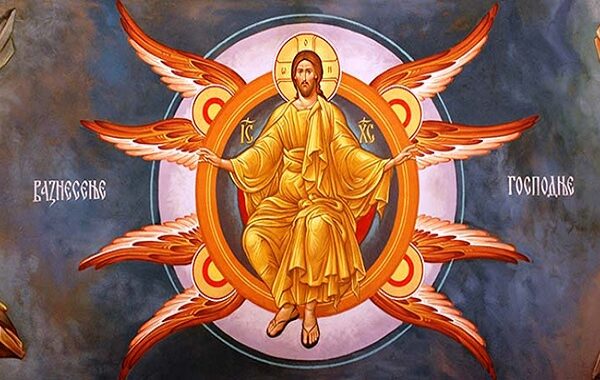The decrepit world was renewed
1 June 2023‘When, by your suffering and resurrection, you had renewed the world aged by many sins, you ascended into heaven, riding on clouds. Glory to your glory’ (Ode 1, Ascension).
Saint Iosif of Thessaloniki, who wrote the second canon of the great feast of the Ascension of the Lord, felt the need to glorify the glory of the Lord. And quite rightly: everything that’s of God, especially his glorifying and redemptive undertaking, is the object of ardor and love for him. If you glorify God, this means that you love him with ardent fervor, giving your heart to him who loved you ‘to the end’. And the invitation comes from him who was taken up on ‘clouds’, from him who went ‘where he formerly was’, where he’d never left as God, that is at the right hand of the Father. Though now he went with his human nature. This is the greatest mystery, which amazed all the angels and the rest of the heavenly powers. The advent of God into the world wasn’t merely a parenthesis in his life, as were the imaginary inventions of the ancient poets who had ‘gods’ intervening in human affairs and then returning to their normality. The normality of the Lord Jesus Christ is that, after his incarnation, he retained forever his human nature, united with his divinity in his single divine personality and hypostasis.

So the Lord ascended ‘in the flesh’ , ‘entirely’ (fulfilling the prophesy without words regarding his own ascension, the ascension of the Prophet Elijah). The very beautiful fifth troparion of the same canon refers precisely to this: ‘Elijah went up into the heavens in a chariot, Lord the giver of life, prefiguring your divine ascension’. This was after the Lord had completed his task: the renewal of the world, which he achieved with the whole of his life, but particularly through his suffering and resurrection. But the renewal he wrought presupposes a world which was corrupt and aged. Because, beginning with the fall and as long as the world continues to exist in its present form, this is what sin will always bring us to: decrepitude. Throughout the ages, and particularly today with our high-tech capabilities, people have tried to stay young forever. They invest the whole of their existence in the body. And they embark on plastic surgeries and aesthetic enhancements in order to keep their bodies as well-preserved and fit as possible. But this a utopian vision. And it is lack of faith, since it reveals a deep-seated fear of death. Because it might just be possible to make the body seem youthful. But the soul and spirit? How are you going to keep these in a state of youthfulness?
So the holy hymnographer reminds us: eternal youth is already a fact. We don’t need plastic surgery or enhancements to acquire it. This is because Christ came into the world and brought it out of its decrepitude by taking it into his own eternal existence. All those who believe and want truly to be part of his life will see the result not of plastic but of real and ontological change. They really will become young, in heart and spirit- that is, in their true self. Saint Paul says that if you’re in Christ, you’ve been made anew, because the Lord himself said: ‘Behold I make all things new’.






